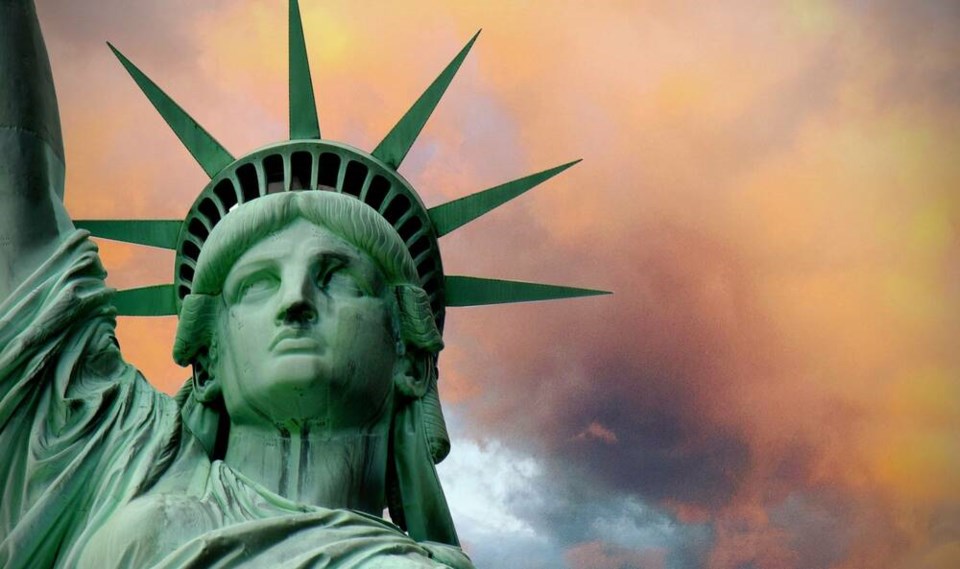Desperate for some inspiration, I decided to reread the entire Declaration of Independence. We know it as an aspirational document (“We hold these truths…”). We understand it as a repudiation of tyranny (“Such has been the patient sufferance of these Colonies; and such is now the necessity which constrains them to alter their former Systems of Government.”). It is both those things, but it is also a compendium of complaints, a description of an autocrat’s offenses against a free people. And that was the part I found strangely relevant to our times.
The signers railed about exclusionary immigration policies that hurt the colonies (“He has endeavored to prevent the population of these States; for that purpose obstructing the Laws for Naturalization of Foreigners; refusing to pass others to encourage their migrations hither”). They inveighed against barriers to trade (“cutting off our Trade with all parts of the world”). And they condemned imposing “Taxes on us without our Consent,” which, if we remember that unilaterally imposed tariffs are a consumer tax, also sounds familiar. Tyrants, then and now, seek to dominate and micromanage commerce to the detriment of ordinary people seeking a better life.
And notice the common problem, then and now, when a tyrant attempts to corrupt the rule of law by seeking to intimidate and threaten members of the judiciary (“He has obstructed the Administration of Justice…. He has made Judges dependent on his Will alone, for the tenure of their offices”); seeks to impair due process (“depriving us in many cases, of the benefits of Trial by Jury”); and even ships people out of the country for punishment (“Transporting us beyond Seas to be tried for pretended offences”). The tyrant playbook has not changed much in nearly 250 years.
Using the military improperly has always been a go-to move for tyrants. “He has kept among us, in times of peace, Standing Armies without the Consent of our legislatures” (or in our case, the governor of California) and tried to make “the Military independent of and superior to the Civil power” (by, among other things, threatening to deploy them to silence protests). “Quartering large bodies of armed troops among us” is still going on in Los Angeles. And “He has excited domestic insurrections amongst us …”—or in Donald Trump’s case, incited violence, called it an insurrection and then used it as a pretext to send in the military.
Though our bill of particulars against Trump bears some resemblance to the Declaration’s list of grievances, it might be useful to include a few of Trump’s more recent offenses:
He has waged war without the authorization of Congress.
He has used his office to enrich himself and corrupt commerce.
He has attempted to quash states’ laws and practices (e.g., California’s air quality standards, sanctuary cities’ prohibitions on cooperation with Immigration and Customs Enforcement).
He has threatened the free press.
He has weaponized the administration of justice against his enemies and released felons who staged an insurrection.
He has installed incompetent, ignorant, and morally compromised people in high office.
He has vowed to strip his political opponents’ citizenship.
He has attempted to usurp the power of the purse.
I could go on.
In a functional democracy with a vibrant, independent and conscientious Article I branch, the compendium of Trump’s offenses would serve as an outline for articles of impeachment. In the era of a pliant, quivering Republican House and Senate majority, the litany of horrors should at least highlight the degree to which Trump has tried to assume the powers of a king. (It’s no coincidence he flocks the Oval Office in gold—décor long favored by monarchs, tyrants, and real estate developers with bad taste.)
Nearly 250 years ago, after listing the offenses against the colonies, the signers of the Declaration felt compelled to declare their break from Britain as the only means to unshackle themselves. We must not (as Trump has) resort to insurrection and/or violence. Thanks to the handiwork of the Constitution ratified 12 years after the Declaration, we have all the tools (e.g., elections, free speech) necessary to maintain our status as a “Free and Independent” people.
We all can use this Independence Day to rouse our fellow Americans from their stupor, recall for them the offenses of our modern tyrant, and summon them to embrace the spirit of the Declaration (“We hold these truths to be self-evident, that all men are created equal, that they are endowed by their Creator with certain unalienable Rights, that among these are Life, Liberty and the pursuit of Happiness”).
We can remind them that generations of Americans have pledged their Lives, Fortunes and sacred Honor for the right to live as free citizens, not helpless subjects of a mad king. And we might then enlist them in the immense task of peacefully recapturing our democracy and reforming all branches of government. Then we might be worthy of the greatest inheritance one might receive: the privilege of being a free people in a country capable of transcending its faults.
I hope you have a meaningful, inspiring, and joyful Fourth of July!
You're currently a free subscriber to The Contrarian. For the full experience, upgrade your subscription.










